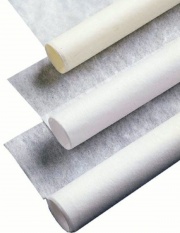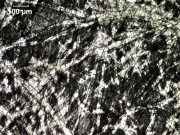Difference between revisions of "Glassine"
m (Text replace - "== Authority ==" to "== Sources Checked for Data in Record ==") |
|||
| Line 1: | Line 1: | ||
| − | [[ | + | [[GlassinePACCIN.jpg|thumb|Glassine protective sheet]] |
== Description == | == Description == | ||
A thin, semitransparent, shiny paper that is strong but flexible. Glassine is made from bleached sulfite wood pulp that has been excessively beaten, hydrated then supercalendered. It is resistant to oils and greases and, when waxed or laminated, nearly impermeable to air and water. Commercially, the most common usage of glassine is for the interior packaging of breakfast cereals. It is also used for temporary interleaving, packaging, bags, envelope windows, and dust covers. Glassine has been used as a facing for the wax lining of paintings since wax will not adhere strongly to it. The translucent paper was formerly used for storage enclosures of photographic negatives, but this action has been determined inappropriate by ISO since the gelatin may attached to the glassine under humid conditions (IPI 2001). Acid-free glassine and buffered glassine tissues are available from archival suppliers. | A thin, semitransparent, shiny paper that is strong but flexible. Glassine is made from bleached sulfite wood pulp that has been excessively beaten, hydrated then supercalendered. It is resistant to oils and greases and, when waxed or laminated, nearly impermeable to air and water. Commercially, the most common usage of glassine is for the interior packaging of breakfast cereals. It is also used for temporary interleaving, packaging, bags, envelope windows, and dust covers. Glassine has been used as a facing for the wax lining of paintings since wax will not adhere strongly to it. The translucent paper was formerly used for storage enclosures of photographic negatives, but this action has been determined inappropriate by ISO since the gelatin may attached to the glassine under humid conditions (IPI 2001). Acid-free glassine and buffered glassine tissues are available from archival suppliers. | ||
| − | [[File: | + | [[File:448-4000.jpg|thumb|Unbuffered See Thru, Acid-Free Glassine]] |
== Synonyms and Related Terms == | == Synonyms and Related Terms == | ||
| Line 16: | Line 16: | ||
Acid treated pulp may darken and become acidic with age (Shelley 1987). | Acid treated pulp may darken and become acidic with age (Shelley 1987). | ||
| − | + | [[File:14 glassine 100X.jpg|thumb|Glassine]] | |
== Additional Information == | == Additional Information == | ||
| Line 53: | Line 53: | ||
| − | [[Category:Materials database]] | + | [[Category:Materials database]][[Category|PACCIN]][[Category|MWG]] |
Revision as of 10:50, 4 November 2018
thumb|Glassine protective sheet
Description
A thin, semitransparent, shiny paper that is strong but flexible. Glassine is made from bleached sulfite wood pulp that has been excessively beaten, hydrated then supercalendered. It is resistant to oils and greases and, when waxed or laminated, nearly impermeable to air and water. Commercially, the most common usage of glassine is for the interior packaging of breakfast cereals. It is also used for temporary interleaving, packaging, bags, envelope windows, and dust covers. Glassine has been used as a facing for the wax lining of paintings since wax will not adhere strongly to it. The translucent paper was formerly used for storage enclosures of photographic negatives, but this action has been determined inappropriate by ISO since the gelatin may attached to the glassine under humid conditions (IPI 2001). Acid-free glassine and buffered glassine tissues are available from archival suppliers.
Synonyms and Related Terms
glazed greaseproof paper; Pergamyn; parchmoid; pergamijn (Ned.); papier cristal (Fr.); Dünnpergamin (Deut.); Pergamin (Deut.); Pergaminpapier (Deut.); carta pergamena (It.); papel cristal (Esp.); pergamynpapper (Sven.)
Other Properties
High fiber density (1.4 grams/cc)
Hazards and Safety
Acid treated pulp may darken and become acidic with age (Shelley 1987).
Additional Information
° M.Shelley, The Care and Handling of Art Objects, the Metropolitan Museum of Art, New York, 1987.
° Image Permanence Institute, Scrapbook Preservation Technical Information, 2001, online at Scrapbook Dictionary
Sources Checked for Data in Record
- The Dictionary of Paper, American Paper Institute, New York, Fourth Edition, 1980
- E.J.LaBarre, Dictionary and Encyclopedia of Paper and Paper-making, Swets & Zeitlinger, Amsterdam, 1969
- Boise Cascade Paper Group, The Paper Handbook, Boise Cascade, Portland OR, 1989
- Matt Roberts, Don Etherington, Bookbinding and the Conservation of Books: a Dictionary of Descriptive Terminology, U.S. Government Printing Office, Washington DC, 1982
- Thomas Gregory, The Condensed Chemical Dictionary, Reinhold Publishing, New York, 3rd ed., 1942
- G.S.Brady, Materials Handbook, McGraw-Hill Book Co., New York, 1971 Comment: p. 576
- Marjorie Shelley, The Care and Handling of Art Objects, The Metropolitan Museum, New York, 1987
- Silvie Turner, Which Paper?, Design Press, New York, 1991
- Website address 1 Comment: Multilingual Glossary for Art Librarians at http://www.ifla.org/VII/s30/pub/mgl.htm
- Irving Skeist, Handbook of Adhesives, Van Nostrand Reinhold Company, New York, 1977
- Teri Hensick, contributed information, 1998
- Book and Paper Group, Paper Conservation Catalog, AIC, 1984, 1989
- Art and Architecture Thesaurus Online, http://www.getty.edu/research/tools/vocabulary/aat/, J. Paul Getty Trust, Los Angeles, 2000PACCINMWG

